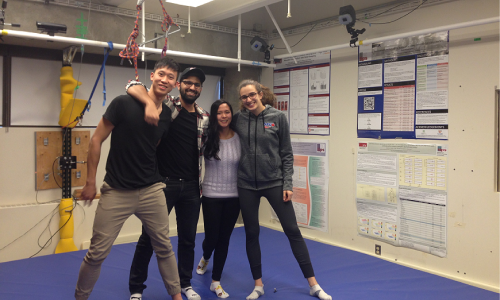
There are plenty of reasons that cause stress in the working environment. One could be not being able to finish a given task within a limited time. Another could be getting assigned something that you’ve never seen before and you don’t know what to do!.
I worked in OSI Maritime Systems as a mechanical engineering co-op student, and I experienced several high-pressure situations in this position. OSI Maritime is a global leading provider of integrated navigation and tactical solutions for naval and maritime security operations. The company sells products and services to more than 20 navies with over 600 warships and submarines. Because of the nature of the business, the design and manufacturing cycle for each project is quite different. On several occasions I was suddenly given an unexpectedly large amount of work. I will share with you the strategies I used to overcome my stress in this fast-paced work environment.
Stay Organized
During my time at OSI Maritime, I used the first three months to review company’s documents. Soon after, my supervisor and other engineers started giving me complicated design tasks and asking for solutions to problems for our products. In many cases, I had to work on three to four projects at the same time, either in the preliminary design stage, or the product review & problem-solving stages. In OSI Maritime, all the projects are categorized to different priorities, which was the main criteria that I used for ordering tasks. It is very common that the finished work will be sent back with more changes after reviewed by engineers. Keeping track of the status of each task was an essential part of my role.
With tons of work on your plate, it is really important to stay organized. Writing down all the tasks in a notebook or in an Excel spreadsheet would be very helpful. Leave some space beside each line for notes, such as keyword, due date or amount of effort required. Having a plan about what you need to do is a great way to decrease stress because it shows you exactly what needs to be done, and when.
This step helps you stay on track with the responsibilities of your position, and it only takes 5 minutes out of the 8-hour working day. When you come back to work after a weekend, by looking at your notes, you are able to quickly get back into the work you left.
Ask for Help
Participating in fixing issues, which occur in the design stage or maintenance, is the key of gaining experience and developing problem solving skills. There are various methods that help solve problems, for example, reading a reference book or googling for solution, but the one that I am going to emphasize here is asking for help from others.
As a co-op student, you spend only four, maybe sixteen months with a company to learn about their projects and to contribute as much as possible. Your supervisor and colleagues who stay longer than you, know more history about the products. When you are asked to solve a problem, they have probably dealt with a similar issue before and know the most efficient solution. Their advice not only helps you get your task done, but also speeds up project development process.
An example of this was when I had to do work as a drafter at OSI Maritime. Sometimes I was asked to look at electrical drawings, although my field was mechanical. Instead of starring at the drawings and stressing over them, I talked to electrical engineers. It saved lots of my time and allowed me to complete more tasks, and also helped me learn more background of the product.
Someone who surprised me the most was a technologist in hardware engineering department. Although he is not an engineer, he had been working in the company for more than 20 years. When I asked him a question, we often ended up discussing possible solutions to other potential problems or useful resources.
But one thing to remember, before you step out and ask a question, always try solving it yourself first. if you are familiar with basic concepts and have your own opinion about the solution it shows initiative and strong character instead of just following what others say.
Be Prepared
Every project in every company has its down time, which means you might have less tasks to complete at work. This is an excellent chance to educate yourself more on the company you’re working for, you could read some reference articles, google a question that confuses you for a while, or check out company’s existing products.
My supervisor lent me a book, “Machinery’s Handbook” printed in 1973, as a reference for one section of mechanical design. It contains everything about mechanical design basics. I found numerous components and their properties that I never had a chance to learn about before. Couple of times when I finished my tasks and was waiting for new ones, I borrowed the book from my supervisor, trying to get more useful pieces of information.
Constantly gaining knowledge of your related field is essential for dealing with unpredictable issues. When you know the answer, you feel less stressed and more confident about facing upcoming problems.
Communication
Let’s say you are working on a task for 10 mins, and you realize that it is not possible to finish within the 30 minutes of budgeted time. What would you do? Communicate with the person who assigned you the work! It is reasonable to extend deadline if you are trying your best. Good communication also give others a better understanding about the difficulty and progress of the task.
In the beginning of my employment with OSI Maritime, I had no idea how long a usual task would take to complete. There were also some accidents from time to time where I got stuck in a tiny program setting problem and the whole thing was delayed because of that. My suggestion to overcome this obstacle is to give yourself an extra 10~15% of your initial estimated time, in case of any technical or non-technical problem. People will always be happy if you finish work ahead of schedule. If you see any signs of significant delay, you should ask for deadline extension immediately, so that others are able to make adjustment to the project in advance and won’t push you to take the responsibility for project delay.
Being able to adapt to fast paced work and juggling multiple tasks really stands out to employers. Unfortunately, this comes with lots of pressure to uphold expectations of high performance on the job. There are many ways to counter the stress, such as through staying organized, asking for help, preparing yourself in advance, and communicating with colleagues. All of these strategies helped me reduce my stress, which lead me to perform well in my co-op position.














